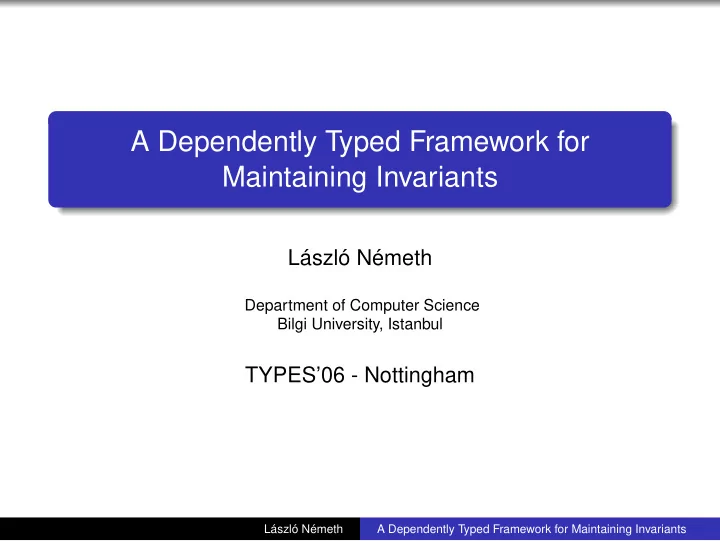

A Dependently Typed Framework for Maintaining Invariants László Németh Department of Computer Science Bilgi University, Istanbul TYPES’06 - Nottingham László Németh A Dependently Typed Framework for Maintaining Invariants
Introduction Maintaining accurate information about programs is important Embedded systems: run-time and space behaviour, guarantees (size) Agressively optimising compilers: any predicate which allows transformation according to some criteria (speed, space) certified compilers: ’ rewrote application of head in line 42, because the list can never be empty’ ultimately: certified code Where to find this information? given some unannotated code, try to discover it: static analysis (difficult) force the user to annotate (or write it in a sufficiently rich language) ? László Németh A Dependently Typed Framework for Maintaining Invariants
Haskell: Prelude vs Report Legacy code: Haskell Prelude ⇐ ⇒ useful information: Report Examples: ’The sequence enumFromTo e 1 e 3 is the list [ e 1 , e 1 + 1 , e 1 + 2 , . . . , e 3 ] ’. The list is empty if e 1 > e 3 . ( R : A -> A -> * ; xs : List A ! data !--------------------------------! ! Sorted R xs : * ) ( a : A ; ss : Sorted R bs ; p : Sm R a bs ! where (---------------------! ; !--------------------------------------------! ! snil : Sorted R nil ) ! scons a ss p : Sorted R (cons a bs) ) ’The Ix class is used to map a contiguous subrange of values in a type onto integers. . . . the nullary constructors are assumed to be numbered left-to-right with the indices being 0 to n − 1 inclusive’. : they are N’s and SORTED careful reading of the Prelude+Report shows up dozens László Németh A Dependently Typed Framework for Maintaining Invariants
Approach Devise enriched types which allows statically track 1 invariants we are interested in Transform well-typed Haskell functions to functions in a DT 2 language which manipulates those invariants Use the stronger type system to maintain and possibly 3 establish properties If typechecks extract 4 Haskell code + rewrite rules Transformed code (beware of code duplication) László Németh A Dependently Typed Framework for Maintaining Invariants
In this talk Two properties Size of lists (Sortedness) We pretend that Haskell is strict deal only with a handful of functions from the Prelude ((++), filter, take, dropWhile, intersect, etc) use Epigram because it is theorem proving well disguised compiler = GHC All (well-typed) combinations of those functions maintain the invariants László Németh A Dependently Typed Framework for Maintaining Invariants
Size (dependently) ( A : * ; lp : Le lb l ; up : Le l ub ! data !---------------------------------------! ! BList A lp up : * ) where (------------------------! ; ! bnil : BList A leZ leZ ) ( a : A ; as : BList A lp up ! !----------------------------------------! ! bcons a as : BList A (leS lp) (leS up) ) László Németh A Dependently Typed Framework for Maintaining Invariants
Map Works ( f : all a : A => B ; xs : BList A lp up ! let !------------------------------------------! ! bmap f xs : BList B lp up ) bmap f xs <= rec xs { bmap f xs <= case xs { bmap f bnil => bnil bmap f (bcons x xs) => bcons (f x) (bmap f xs) } } and we get the usual goodies ( xs : BList A (leS n) u ! let !------------------------! ! bhead xs : A ) bhead xs <= case xs { bhead (bcons m’’ ms) => m’’ } László Németh A Dependently Typed Framework for Maintaining Invariants
Other Prelude Functions append adds the lower bounds and the upper bounds (think of the definition list comprehensions!) filter changes the proof about the lower bound to zero (ie the proof of) intersect sets the lower bound to zero and the upper bound to the minimum of the length of the lists take n sets the length to be exactly n if the lower bound is greater than n . . . . László Németh A Dependently Typed Framework for Maintaining Invariants
What Transformations are Possible take 3 ==> lambda xs. case xs of (x1:xs1) -> x1 : case xs1 of (x2:xs2) -> x2 : case xs2 of (x3:xs3) -> x3 : [] László Németh A Dependently Typed Framework for Maintaining Invariants
Message Instead of a whispering important properties (in the Report) SAY them in the types of (dependently typed) functions and make some compiler SEE them. László Németh A Dependently Typed Framework for Maintaining Invariants
Summary more you say more you (should) get can be done under the hood (no extension to Core or Haskell itself) the approach complements the optimising capabilities of GHC TODO PiE - formalise the Prelude (plus the Report!) in Epigram: good for the soul, good for compilation, and Haskell programmers can also read it once we established some invariant (and possibly acted upon) it is a shame to throw it away László Németh A Dependently Typed Framework for Maintaining Invariants
Recommend
More recommend